FIDE World FR Championship: Home and away – a day of double duels
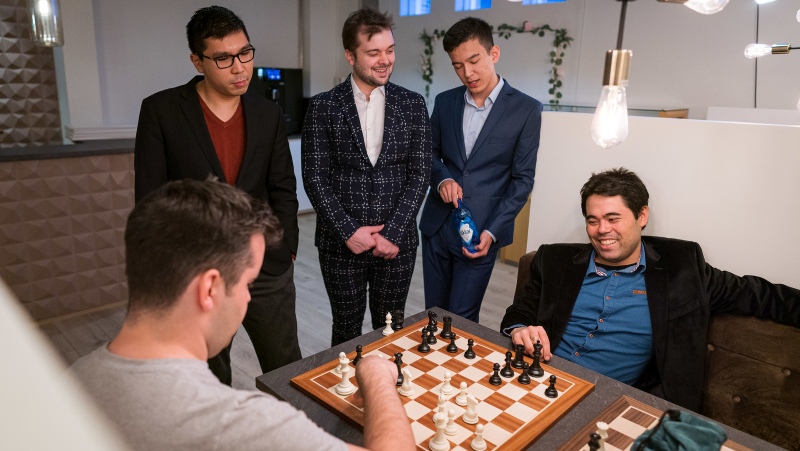
The pairings are the simplest aspect of today’s group stages, as the players face off four times against the same opponent, in two mini-matches, as the contest transitions into the return matches from rounds 3 to 4. Even though the match-ups repeat, the mini-matches were played from two different starting positions. It is interesting to watch the players marching through the hotel to the playing area. On the move a few minutes before the round begins, this means that they really have closer to just 10 minutes to prepare to play the match’s starting position once from each side. Perhaps it is this shortage of time and vast unexplored sea of possibilities to try to chart that explains the visibly relaxed mood before the game and optional lack of emphasis on preparation. Relaxed and enthusiastic The players without analytical seconds here – Matthias Blübaum, Wesley So and Hikaru Nakamura, are first to appear. Young Nodirbek Abdusatorrov, who is accompanied by his mother on the trip, is not far behind. Perhaps even more surprising is that classical world champion Magnus Carlsen, and his last challenger, Ian Nepomniachtchi, stroll towards the playing hall, discussing some kind of sequence of moves. Even if the subject is perhaps one of the games from day one, there is a sense that the novelty of Fischer Random has stimulated a renewed curiosity and enthusiasm for exploring action on a chessboard. Start position 1 The position that has come ‘out of the hat’ for the first mini-match is finally about as exotic as possible and gets a strong reaction from a few of the players. Carlsen remarks to group rival Vladimir Fedoseev: “This is probably the worst possible starting position!” Fedoseev also thinks fate has been cruel: “The position with both Knights in the corner should be banned from the drawing!” Favourites and crunch matches The day’s play was officially opened by Thordis Loa Thorhallsdottir, the President of the Reykjavik city council, who executed the first move for Icelandic Grandmaster Hjorvar Steinn Gretarsson. Again, each group featured a pairing with a heavy favourite versus the section outsider and one clash of expected serious title contenders. The favourites delivered smoothly: Carlsen shrugged off yesterday’s misadventures and showed his usual crisp technical control to defeat Blübaum with the black pieces, while terrifying teenager Abdusatorrov handed local hero Gretarsson another loss, the Uzbekistan Grandmaster also winning with the black pieces. In Group A, the reigning Fischer Random World Champion Wesley So continued to be the hardest working player here, grinding out a 106-move win over Nepomniachtchi, his third marathon game so far. These two may have been the pre-event favourites to emerge from the group, but with Abdusatorrov’s form and power, this duel may instead decide which of these classical chess giants is denied a semifinal berth. The Group B spotlight game between Nakamura and Fedoseev ended in a solid and fairly early draw. Second session The reverse pairing was quickly the highlight of the next session, with Fedoseev unleashing the well-known aggressive beast within, forcing Nakamura to show his legendary resourcefulness under pressure. The result – a baffling, chaotic brawl that somehow resulted in a roughly balanced endgame. The players battled on until there were only bare kings left on the board, and honours were divided in the mini-match. In Group A Nepomniachtchi showed his sense of occasion and went into turbo mode in the return game, accumulating a huge time advantage while posing So an array of problems to solve. Nepomniachtchi’s win created the first drawn match of the event. Favourites Carlsen and Abdusatorrov each won again, though they needed to overcome grittier levels of resistance. Their respective opponents now need to seriously rally if they are to avoid being slotted into the eventual playoff match for 7-8 place. Abdusatorrov was asked by NRK TV if he was, in fact, the tournament favorite here. He thought for a moment before giving a diplomatic answer that did little to disguise his immense confidence: “Magnus is always the favourite. But this is Fischer Random, and anything can happen.” Pairings & results: Round 3 Game 1: Group A Grétarsson – Abdusattorov 0-1 So – Nepomniachtchi 1-0 Group B Blübaum – Carlsen 0-1 Nakamura – Fedoseev 0.5-0.5 Round 3 Game 2: Group A Abdusattorov – Grétarsson 1-0 Nepomniachtchi – So 1-0 Group B Carlsen – Blübaum 1-0 Fedoseev – Nakamura 0.5-0.5 Match scores from Round 3: Group A Abdusatorrov – Gretarsson 2-0 So – Nepomniachtchi 1-1 Group B Carlsen – Blübaum 2-0 Nakamura – Fedoseev 1-1 More of the same? The next round featured the same pairings, but a new starting position. Start position 2 This development seemed to intrigue and puzzle the field. Nepomniachtchi reacted by judging it “too complex”, while Carlsen went into a bit more detail for Norwegian TV, telling national broadcaster NRK that it was “not a position I have seen before. It’s very interesting – the kings are relatively safe.” Drama and confusion The key Group A match between Nepomniachtchi and So started with a sharp battle and ended with a confusing incident when it appeared that title-holder So became confused about the variant’s trickiest aspect, the castling rule. At first, it appeared that So had just blundered horribly, but arbiters were summoned, and a discussion took place. Apparently, So had initially believed he could castle out of check in the final position, but even if Fischer Random castling looks different, the rules governing it are the same as in classical chess – one cannot escape a check by castling. Once So realized his error, he resigned. Oddly, this was not the first castling incident between the two players. In the inaugural event in 2019, there was a dispute about whether Nepomniachtchi had castled properly and a game had to be replayed. Today’s event was a clear signal that this variant of chess is still in its infancy when the current world champion can forget the details of a central rule. Later, Carlsen would confess he
Women’s Candidates Pool A: A peaceful day at the office
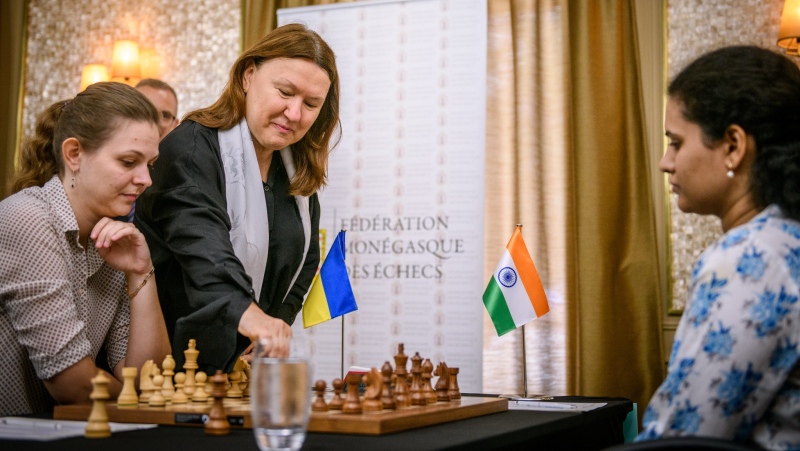
The second round of the Women’s Candidates Pool A semi-finals was launched by Louis Starck, Hermitage Hotel General Manager and Inna Bazhenova, publisher of The Art Newspaper Group. After their losses yesterday, both Muzychuk sisters were looking to bounce back with white pieces. Naturally, their opponents went for a very solid approach. Indeed, the well-reputed Petrov defence occurred in the Muzychuk – Humpy encounter as well as in the Muzychuk – Lei one. Although having similar results and openings, the two games went in completely different directions as early as move 3. In the Muzychuk-Koneru game, Anna thought for 38 minutes before playing 15.Bg5? in a slightly better position – the move chess engines consider to be a serious mistake. Humpy reacted in a great way and, after another misstep by Anna (18.Rxe6?), reached a position where she had a decisive advantage. However, Humpy did not manage to find 18…Ne5! repelling all White’s threats and winning material. 18… Ne7 was played instead, which led to a draw by repetition on the move 28. Fun fact: the players got a warning from the arbiter as they only repeated four times and agreed to a draw without asking for the arbiter’s permission. According to the regulations, you can draw with the arbiter’s permission after a threefold repetition or the game is instantly declared a draw after a 5-time repetition. As for the Muzychuk-Lei game, it seems like the Chinese player never was in danger with the black pieces after showing some high-quality preparation. The opponents followed the footsteps of Vladimir Fedoseev and Richard Rapport up to move 14, where Lei deviated, but it did not change the evaluation of the position as roughly equal. A draw was agreed on move 40 in a dead-even rook endgame. Tomorrow, on the 27th of October, there will be a rest day. Time for the players to recharge their batteries to provide even more excitement! Official webstie: womenscandidates.fide.com Text: WGM Andreea Navrotescu Photo: Michał Walusza ORGANIZERS: PARTNERS:
FIDE World FR Championship: Veterans show muscle; teenager shows fire
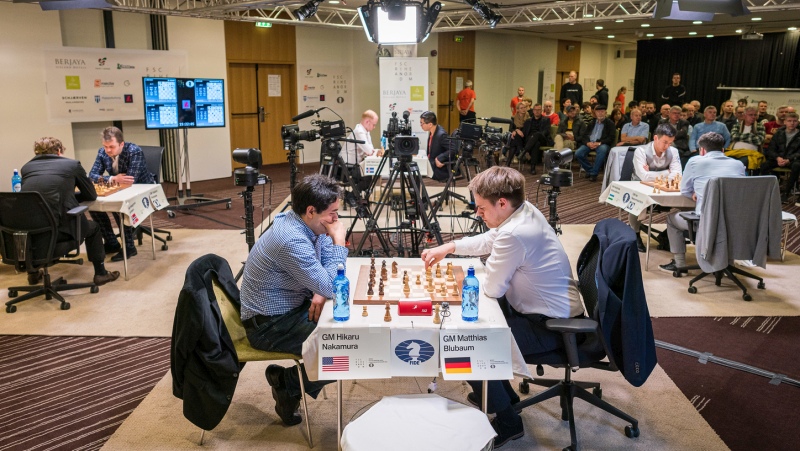
The first day of play saw two rounds of two-game mini-matches in each group and the contours of the competition beginning to emerge. The big questions were who would adapt best to the challenges of the Fischer Random variant and if there would be any unexpectedly good form from the newcomers to the event. It is too early for answers, but there were some clear signs. The experienced Fischer Random players looked to have an edge; the youngest player in the event appeared determined to add to his trophy cabinet; and the classical world champion seemed to suddenly lose focus. Setting the stage The unveiling of the first start position raised some eyebrows. This is done, piece by piece, via a graphics sequence created by Norwegian national TV broadcaster NRK, and when the first three pieces landed on their usual squares, things were definitely not looking random. Finally, half of the eight pieces did appear on new spots, and the players rushed off to use the brief 15-minute interval to puzzle over their initial strategies. The event was officially opened with a fine 50th-anniversary echo when Gudmundur G. Thorarinsson, President of the Icelandic Chess Federation during the immortal Fischer-Spassky match here in 1972, made the first move in the game Hjorvar Steinn Gretarsson-Wesley So. Action! Starting position for Round 1 Expert online commentator Peter Leko was surprised by how quickly several of the Grandmasters chose to play from the start since the most confusing phase of Fischer Random is the uncharted opening. When two of the games erupted in very serious early violence, Leko predicted that more caution would probably be in order in future rounds. Early impact In Group B, Classical World Champion Magnus Carlsen showed both his strength and his Fischer Random experience by investing most of his thinking time early and smashing through quickly to take the lead against an impulsive Vladimir Fedoseev. In Group A, it was teenage prodigy and reigning World Rapid Chess Champion Nodirbek Abdusattorov who showed his class early, dismantling two-time classical title challenger Ian Nepomniachtchi with a whirlwind sacrificial attack. Enthralling brawls The other games from the first session were extremely long, nervy and hard fought. Local hero Gretarsson gave the Icelandic crowd something to cheer about when he held defending Fischer Random (FR) World Champion Wesley So to a draw – after 100 moves – while FR veteran Hikaru Nakamura managed to overcome Matthias Blübaum in an incredibly complex game that had both players surviving on a few seconds per move, and afterwards had them both completely baffled about what they had just been through. Changing sides The reverse pairings for these matches had opposite scenarios, with So and Nakamura quickly clinching mini-match victory, So with a swift mating attack and Nakamura with a solid draw. The initial mismatches turned into the long battles of the round, with Carlsen finding himself in surprising difficulties after blundering material against Fedoseev. Still, Magnus produced a fortress that was enough to hang on for a draw and clinch the match result. Meanwhile, young Abdusattorov took care to keep the always dangerous Nepomniachtchi at arm’s length before grinding out a second win over his experienced opponent. Round 1: Group A Gretarsson – So 0.5-0.5 So – Gretarsson 1-0 Match scoring: So – Gretarsson 2-0 Abdusattorov – Nepomniachtchi 1-0 Nepomniachtchi – Abdusattorov 0-1 Match scoring: Abdusattorov – Nepomniachtchi 2-0 Group B Carlsen – Fedoseev 1-0 Fedoseev – Carlsen 0.5-0.5 Match scoring: Carlsen – Fedoseev 2-0 Blübaum – Nakamura 0-1 Nakamura – Blübaum 0.5-0.5 Match scoring: Nakamura – Blübaum 2-0 Round two – giants clash Starting position for Round 2 The second session was opened by another president – this time not a chess dignitary but Gudni Th. Jóhannesson, the actual President of Iceland. He made the first move in Nakamura – Carlsen. Nakamura seemed to be amused by something the President said afterwards, while Carlsen focused on what would be his own, spectacular first move. The combination of Fischer and chess seems to ignite something here in Iceland. The event is also being broadcast on national TV here, and there was a long queue to get a seat in either the commentary in the venue auditorium, or a ringside seat in the playing area. The Group A pairing of So-Abdusattorov became the main attraction after the latter’s destruction of Nepomniachtchi, while the classic collision between Carlsen and Nakamura at the top of Group B was foreseen as the heavyweight contest there. These games lived up to expectations: So and Abdusatorrov was a marathon, with the players slugging it out for dozens of moves with only a handful of seconds left throughout. So gradually saw a large advantage evaporate, and his young opponent was visibly pleased when the point was finally split. Nakamura and Carlsen was a sophisticated affair between two experienced ‘randomers’, with clever ideas being skillfully neutralized, and this game was drawn too. In the remaining encounters, the newcomers had to endure some rough treatment at the hands of their more practiced opponents, with Nepomniachtchi punishing Gretarsson, and Fedoseev making the most of his combination of strong pressure on the board and Blübaum’s self-inflicted time trouble. Return matches Once again, the top match-ups developed slowly. While these came to a boil, Nepomniachtchi continued to make up for his earlier upset by roughing up Gretarsson again, blasting his way through to another mating attack. Blübaum put Fedoseev through the wringer, but the game gradually drifted towards equality and a mini-match victory for the latter. Wesley So had commented much earlier in the day that his young opponent appeared to be on fire, and Abdusattorov showed more of the skills that have made him a World Rapid Chess Champion. First, he forced the reigning Fischer Random champion on the defensive and then smoothly converted his advantage with a fine blend of tactics and technique. In Group B, Carlsen appeared to be gaining the upper hand against Nakamura, but some very tricky play by the American left
FIDE World Teams squads announced for Jerusalem 2022

The 12 teams for the FIDE World Team Championship in Jerusalem (November 19-26) have been confirmed. In the line-ups of the participating teams we find stars like Maxime Vachier-Lagrave, Anish Giri, Teymur Radjabov, and Shakhriyar Mamedyarov, along with up-and-coming prodigies like Javokhir Sindarov and Nihal Sarin, and illustrious veterans like Vasyl Ivanchuk and Alexei Shirov.This is the complete entry list: FIDE DELEGATES Alex Holowczak Chief Arbiter Emil Sutovsky Chief of Appeal Committee Zurab Azmaiparashvili A member of Appeal Committee Boris Postovsky A member of Appeal Committee Alon Shoulmann Deputy Chief Arbiter Alexey Root Press Officer Gopakumar Sudhakaran Anti-cheating Committee Rep. Garcia Leontxo A Spanish press reporter Viswanathan Anand Commentator Almira Skripchenko Commentator ISRAEL Ilana David Captain Maxim Rodshtein player Tamir Nabaty player Avital Boruchovsky player Ilia Smirin player Evgeny Postny player Ori Kobo player POLAND Michal Bartel Captain Radoslaw Wojtaszek player Mateusz Bartel player Kacper Piorun player Bartosz Socko player Szymon Gumularz player Igor Janik player UKRAINE Yurii Gnyp Chief of delegation Oleksander Sulypa Captain Igor Kovalenko player Vasyl Ivanchuk player Andriy Volokytin player Kirill Shevchenko player Vitali Bernadskyi player Mykhaylo Oleksyenko player CHINA Wen Yang Captain & player Xu Xiangyu player Bai Jinshi player Lu Shanglei player Li Di player NETHERLAND Jan Smeets Captain & player Anish Giri player Jorden Van Foreest player Lucas Van Foreest player Max Warmerdam player Robby Kevlishvili player FRANCE Jean-baptiste Mullon Captain & Chief of delegation Maxime Vachier-lagrave player Jules Moussard player Laurent Fressinet player Maxime Lagarde player Tigran Gharamian player INDIA Suri Vaibhab Captain Gujarathi Vidit Santosh player Sunilduth Lyna Narayanan player Sarin Nihal player Krishnan Sasikiran player Sethuraman Panayappan Sethuraman player Gupta Abhijit player SOUTH AFRICA Hendrink Petrus Du Toit Captain & Chief of delegation Kenneth Terence Solomon player Daniel John Cawdery player Daniel Barrish player Banele Fortune Mhango player UZBEKISTAN Husan Turdialiev Chief of delegation Ivan Sokolov Captain Nodirbek Yakubboev player Javokhir Sindarov player Jakhongir Vakhidov player Shamsiddin Vokhidov player Abdimalik Abdisalimov player Ortik Nigmatov player USA John Donaldson Captain Hans Niemann player Lazaro Bruzon player Alexander Onischuk player Varuzhan Akobian player Yuniesky Quesada Perez player SPAIN Javier Ochoa de Echagüen Chief of delegation David Martinez Captain Jaime Santos player David Anton player Alexei Shirov player Daniil Yuffa player Miguel Santos player AZERBAIJAN Nijat Abasov Captain Shakhriyar Mamedyarov player Teimour Radjabov player Rauf Mamedov player Aydin Suleymanli player Gadir Guseinov player Vugar Asadli player Under the exciting new format devised for this competition, the participant countries will now be split into two pools of similar strength, taking as a reference the rapid rating list for November 1st. The four best teams from each pool will advance to the knock-out stage, where they will play Quarter-finals, Semi-Finals, and Final, with each duel consisting of two matches between the teams. The time control will be 45 minutes for the whole game with an increment of 10 seconds per move starting from move 1. The event, organized by FIDE and the Israel Chess Federation with the support of the Israel Ministry of Sport and Culture, will be held at the Mount Scopus Hall in the Dan Hotel in Jerusalem. Former World Champion Viswanathan Anand and the seven-time French Women’s Chess Champion Almira Skripchenko will be the commentators. The Chief Arbiter for the event will be Alex Holowczak (ENG), with Alon Shulman (ISR) as his Deputy, and M S Gopakumar (IND) as Fair Play officer. You can read the complete regulations in the FIDE Handbook. Official website: worldteams.fide.com
Women’s Candidates, Day 1: White start strong
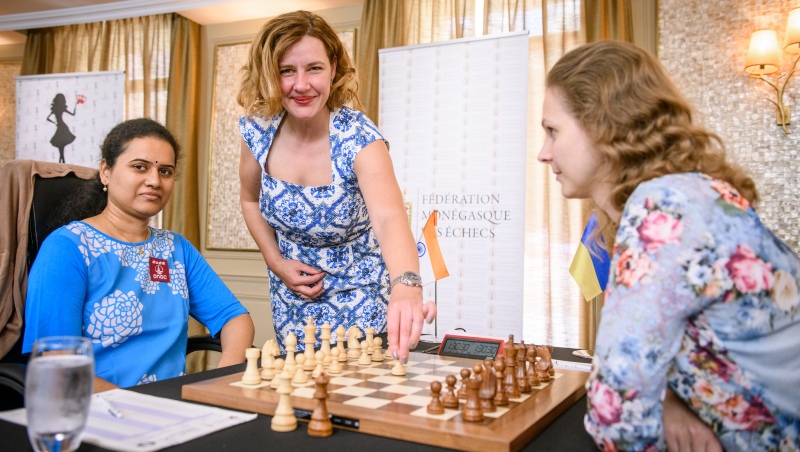
The first round of the 2022 Women’s Candidates tournament started with the encounters Lei Tingjie vs Mariya Muzychuk and Humpy Koneru vs Anna Muzychuk, with both Muzychuk sisters having black pieces. The same first move (1.d4) was made by Zhu Chen, former Women’s World Champion and FIDE Treasurer and Dana Reizniece-Ozola, Deputy Chair of FIDE Management Board and ECU Deputy President in both games. Humpy Koneru was the first to score a convincing win over Anna Muzychuk. Even though, according to Humpy, she did not expect the Queen’s Gambit Accepted by her opponent, she seemed to be more familiar with the emerging position. On move 15 Anna was forced to move her king, losing her castling option, but it would not have been that dangerous had she found the precise 16…Qb7! trading the queens. After Anna missed this chance, the queens remained on the board, and White preserved some initiative. As Humpy said in the post-game interview, she felt confident when she saw Anna taking on h2. One more mistake from Muzychuk – 18…Bd6 (19…Be5 looks better) and Black’s position collapsed. The game ended with a very nice tactical shot – 23.Nd6! Anna tried 23…Qxd6 but had to capitulate after simple 24.Rxa7 1-0 Lei Tingjie played a very high-quality game Mariya Muzychuk. After enjoying a comfortable advantage on the clock from the opening, Lei thought for a long time about the breakthrough 16.e4!? It seems she picked the right moment, as Black was slightly behind in development. Mariya’s reaction was not optimal. She decided to sacrifice her b7-pawn but did not get sufficient compensation. A few moves down the road, she went for White’s b2 pawn, but it was a deadly waste of time. Lei regrouped her pieces and, after another powerful breakthrough in the center: 25.d5! Black’s defences crumbled | 1-0, 53 moves Lei emerged two pawns up and converted her material advantage with flawless endgame technique. It a very exciting first round that produced two decisive outcomes. Humpy Koneru and Lei Tingjie made an important step toward the final, but the Muzychuk sisters will do everything in their power to strike back with White tomorrow. OFFICIAL WEBSITE: womenscandidates.fide.com Text: WGM Andreea Navrotescu Photo: Michał Walusza ORGANIZERS: PARTNERS:
FIDE World Fischer Random Championship: Group stage ready to begin
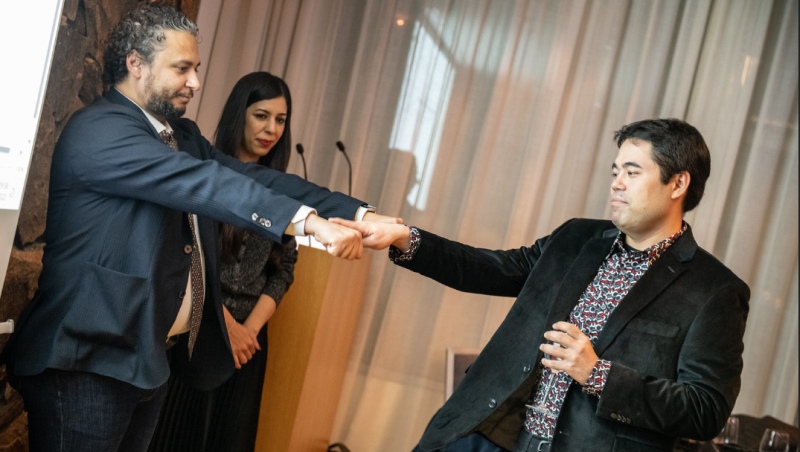
The opening ceremony for the official ‘Fischer Random’ world title — a chess variant where the pieces are shuffled around out of their usual starting positions — was held in Reykjavik on Monday evening. The capital of Iceland is also celebrating the 50th anniversary of the historic classical chess duel between Bobby Fischer and Boris Spassky, which put both country and the game into the spotlight. Groups first The eight qualified Grandmasters took part in a double-drawing of lots, as they were first placed in two preliminary groups and then made the second round of choices to determine the order of the games. Reigning Fischer Random champion Wesley So, and the runner-up in the previous title event, classical World Champion Magnus Carlsen, were placed in different groups to keep possible favourites rematch alive for later stages. After this, chief arbiter Omar Salama distributed the remaining pairs of evenly rated players by offering his outstretched fists, one of which concealed a pawn. Each of the players given a choice: Hikaru Nakamura, Vladimir Fedoseev and Matthias Blübaum — picked an empty hand, and joined Carlsen in Group B. Ian Nepomniachtchi, Nodirbek Abdusattorov and Hjörvar Steinn Grétarsson were placed in the defending champion’s Group A. Pairings second Next, each of the players was called up to choose a hidden number, folded underneath a wooden pawn, to determine their order of play. This resulted in the line-ups for the first day of play: Round 1: Group A Hjörvar – So Abdusattorov – Nepomniachtchi Group B Blübaum – Nakamura Carlsen – Fedoseev Round 2: Group A Nepomniachtchi – Grétarsson So – Abdusattorov Group B Fedoseev – Blübaum Nakamura – Carlsen The routine The start position — one of 959 possible — will be chosen at random 15 minutes before the beginning of each round. The players will play one game with each colour from this starting position. They can only consult with their designated assistant in this short window of time before the two games are played and cannot use any notes or devices. The player who wins the two-game match will score two points. A drawn match will score one point each. A lost match scores no points. The time control is the so-called ‘slow rapid’: Each game is 30 moves in 25 minutes, plus 5 minutes for the rest of the game after move 30, plus 5 seconds increment per move starting from move 31. The President of the Icelandic Chess Federation, Gunnar Bjornsson, made the opening speech Round one will begin at 15:00 GMT (17:00 CET). Possible highlights While the sharp styles of the players and the unexplored territories of Fischer Random should guarantee exciting games, a few match-ups are worth mentioning. Local attention will undoubtely be focused on the starting duel between Icelandic Grandmaster Grétarsson and defending champion So. The long-running rivalry between Carlsen and Nakamura, who contested the unofficial Fischer Random title match in 2018 that sparked the revival of interest in the variant, should also pack a punch. Assistants and supporters Perhaps the biggest attraction of Fischer Random chess is how it eliminates the huge body of opening preparation built up over decades and now enhanced with superhuman machine assistance. With this in mind, some of the players have opted for moral support from family or friends over a designated assistant. For example, Champion Wesley So is here with his mother. He emphasized how much he loves the difference Fischer Random provides, saying he clearly prefers it over classical chess, with its hours of opening preparation and kids wielding long, memorized, computer-generated variations. Playing Fischer Random is better, he says — but harder. At least as happy Arguably the most fascinating choice of assistant has been made by Hjörvar Steinn Grétarsson, who is aided by his childhood coach, former top Icelandic Grandmaster Helgi Olafsson. Hjörvar says that this assignment made Helgi at least as excited as Hjörvar himself was when he got a wild card spot in the event. The choice also has neat historic echoes. Helgi became Bobby Fischer’s close friend when the former world champion eventually immigrated and setted in Iceland, and he had the rare and possibly very valuable privilege … of playing Fischer Random with Fischer himself. Text: GM Jonathan Tisdall Photo: David Llada and Lennart Ootes Official website: fischerrandom.fide.com
Women’s Candidates Tournament (Pool A) starts in Monte-Carlo
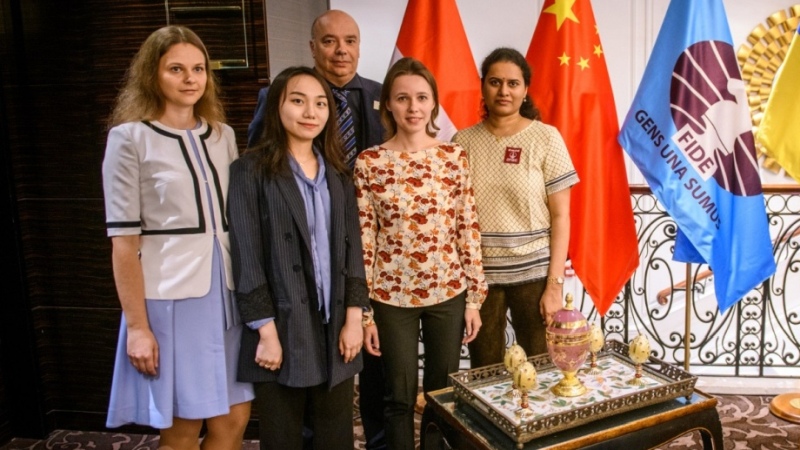
The Women’s Candidates Tournament (Pool A) kicked off at the glamorous Hotel Hermitage Monte-Carlo with a glittering opening ceremony on October 24. The first part of the ceremony included a media reception where the journalists had the privilege to spend time with the players, asking them questions and taking photos in playing conditions. A lot of special guests attended the ceremony, and various of them had the opportunity to give inspirational speeches. It was especially the case with Dana Reizniece-Ozola, FIDE Management Board Deputy Chair, who stated that Monaco was the perfect place to celebrate the “intelligence and the beauty of women in chess”. Emmanuel Van Peteghem, secretary of the main sponsor of the event, the SBM company, added that they were very proud to support the chess discipline. Jean-Michel Rapaire, president of the Monaco chess federation, affirmed that it was a pleasure to organize once more an international tournament of this calibre in Monaco. Inna Bazhenova, another cornerstone of the event, based her intervention on the comparison between chess and art and finally, Arkady Dvorkovich, FIDE President, announced the start of the tournament, insisting on the fact that the event “will be interesting for the entire world” since the field involves players from Europe and Asia. The drawing of colours was as chic as the place where it happened. The players opened Fabergé like exquisite pearl eggs to reveal the queen chess piece, which indicated the colour. Humpy Koneru and Lei Tingjie will start with White against Anna and Mariya Muzychuk, respectively. Below you can also find a schedule for the event, as well as a short profile of each of the participants in this pool. Mariya Muzychuk Born September 21, 1992 Federation: Ukraine Rating: 2530 Mariya Muzychuk was the Women’s World Champion in 2015-16 and reached the semi-finals in the Women’s World Championship in 2018. She earned her spot for the Women’s Grand Prix 2022-23 thanks to her 4th place in the FIDE Grand Swiss 2021 held in Riga. Mariya was born on September 21, 1992, in Stryi, Lviv Region, Ukraine. She started her chess career in the village of Ugersko, where her parents used to work at a local sports school for children and youngsters. However, Mariya managed to train at home, too: her elder sister Anna used to help her along with her parents. Since she was 7, Mariya has participated in the Ukrainian youth championships; in 2002, she won the Ukrainian and European championships for children under 10. At the age of 11, Mariya was shortlisted for the Ukrainian women’s championship, then she won the world youth championship for children under 14 and later repeatedly won medals at the European and world youth championships. Her success at the European women’s championships brought Maria the title of women’s grandmaster, and in 2008 she was awarded the title of International Master. After taking her first serious steps into professional chess, Muzychuk was admitted to the Ukrainian national team (while her elder sister was playing for Slovenia); as a member of the Ukrainian national team, she was the silver medalist (2018) and a three-time bronze medalist (2012, 2014, and 2016) of the Olympiads, as well as the women’s World and European (2013) champion as a member of the Ukrainian team. Moreover, she won the gold medal at the 2018 Olympiad holding the best result on the second board. She is a two-time Ukrainian women’s champion (2012 and 2013). Muzychuk got her moment of glory in the 2015 knockout World Women’s Championship in Sochi: after outplaying Yuanling Yuan, Monika Socko, Antoaneta Stefanova, Humpy Koneru, Harika Dronavalli, and Natalija Pogonina one by one, the Ukrainian grandmaster became the fifteenth Women’s World Champion. In March 2016, Mariya Muzychuk failed to defend her title in a match against Hou Yifan, China. In 2014, Mariya Muzychuk won the first women’s prize at a prestigious Gibraltar Open tournament. Her beginning of this year has been fruitful: she won the second women’s prize in the same tournament, demonstrating an impressive performance with the score of 2718 points. Mariya Muzychuk holds the honorable FIDE Caissa award as the best women’s chess player in 2015. At the FIDE Women’s Candidates Tournament 2019 (Kazan, Russia) Mariya Muzychuk was the only woman chess player to defeat the tournament’s winner, Aleksandra Goryachkina, with their match game having been awarded the special prize for being the most beautiful game of the tournament. Like many other Ukrainian players, Mariya had to reallocate abroad since the start of the war, and for the last months, she has been living with her sister in Valencia, Spain. Despite the added difficulties, Mariya successfully defended the first for Ukraine at the Chennai Chess Olympiad, leading her team decisively contributing to a historical gold medal. Tingjie Lei Born March 13, 1997 Federation: China Rating: 2535 Throwback to the FIDE Grand Swiss 2021 in Riga, round 10: after making a draw against Mariya Muzychuk, the leader of the women’s event Lei Tingjie became the winner of the competition with one round to spare (!!) and qualified for the FIDE Women’s Candidates Tournament. This huge achievement is certainly the peak of her career, at least for now… Lei was born on the 13th of March 1997 in Fuling District, an area in Chongqing. The municipality of Chongqing, roughly the size of Austria, includes the city of Chongqing as well as various discontiguous cities. It is located in the Southwest of China. In 2014, at the early age of 17, Lei won the 4th China Women Masters Tournament in Wuxi on a tie-break from Ju Wenjun and was awarded the title of Woman Grandmaster (WGM) by FIDE. This was the rocket launch of her very impressive international career. In 2015, she won the women’s open event of the Moscow Open, ahead of World Junior Girls Champion Aleksandra Goryachkina (playing in the B Group of the Women’s Candidates). Lei has very convincingly represented team China on various occasions and just to mention the two most outstanding performances, she was part of
Uzbekistan to host Pool B of Women’s Candidates Tournament

The FIDE president Arkady Dvorkovich announced today, during the opening ceremony of the FIDE Women’s Candidates Tournament in Monaco, that Pool B for this event will be hosted in the ancient city of Khiva, in Uzbekistan. The event will take place from November 28 to December 11. This bracket will see the clash between the 2020 runner-up Aleksandra Goryachkina, Alexandra Kosteniuk and Tan Zhongyi as the top finishers at the FIDE World Cup 2021, and Kateryna Lagno as one of the top-three finishers at the FIDE Women’s Grand Prix 2019–2021. Under the new knock-out format, players in each of the two brackets or “pools” will play a four-game match (plus tie-breaks, if needed) in order to advance to the next stage, with the final match being played over the distance of six games. The prize fund for this pool is €70,000, while another €110,000 will be at stake in the Women’s Candidates Final, raising the total to a record-breaking amount of €250,000. With a current population of about 90,000 inhabitants, Khiva was founded approximately 2,500 years ago and was once one of the most important cities on the silk road. In modern times it has been overshadowed as a tourist attraction by its neighbouring cities of Tashkent and Samarkand, but as of recent, it is receiving the interest it deserves, thanks to its preserved architecture. Regarded as the capital of the Turkic world, it offers visitors a clustered array of mosques, madrassahs, and tiled minarets. Khiva is now receiving worldwide attention as a destination, and it was declared the tourist capital of the Islamic world in 2024. Photo: Fulvio Spada
Year of the Woman in Chess: New podcast episode released
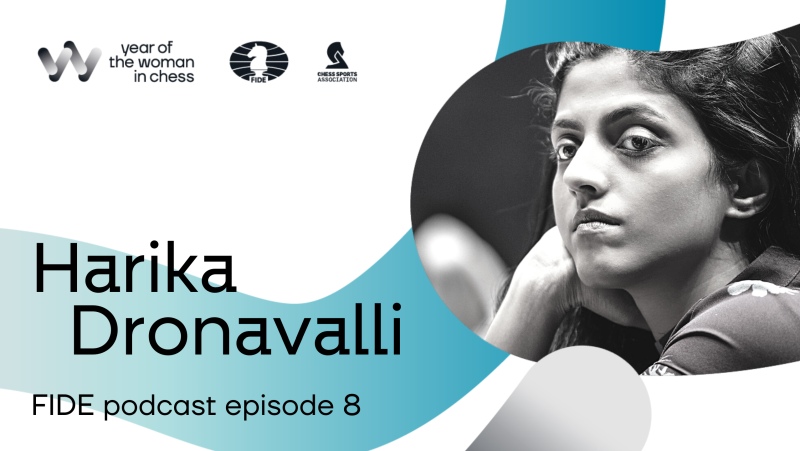
The FIDE Podcast is one of the major initiatives born under the umbrella of the Year of the Woman in Chess, as cooperation between FIDE’s Commission for Women’s Chess, Michael Busse of Schachgeflüster podcast and Lilli Hahn of the Chess Sports Association. Its monthly episodes present a series of interviews with remarkable women in the chess world. During 2022 the FIDE Podcast featured a four-time Women’s World Chess Champion Hou Yifan, an American chess player, commentator and writer Jennifer Shahade, the first female President of a chess federation in Africa Susan Namangale, a Woman Grandmaster, doctor of psychology and a university professor Jana Krivec and other outstanding female role-models. The guest of the October episode is Harika Dronavalli, an Indian Grandmaster, #12 in the women’s ranking list. Harika won three bronze medals at the Women’s World Chess Championship in 2012, 2015 and 2017. Her recent achievement was winning the bronze medal with the Indian women’s team at the Olympiad in their home country. As if not impressive enough on its own, Harika played in the Olympiad during her ninth month of pregnancy and gave birth to a baby girl just two weeks after. In the podcast, Harika Dronavalli talked about combining her chess career with pregnancy and motherhood. “When it was announced that India is going to host the Chess Olympiad, I realized that maybe this is a possibility for me to play, because I could travel, as Chennai is very close to my place. I was still not sure because it would be my last trimester. When I asked my doctor, she said it’s not so difficult to play if you’re healthy. It’s even easier to play during pregnancy than immediately after the delivery. That’s when I contacted my federation and told them that I could play.” “I knew some cases when people played in early trimesters or during the sixth month of pregnancy. But I’ve never heard of someone playing during the ninth month. I was not sure how this would do, but I believed in my decision that somehow things would work, and everything would go smoothly until the end of the tournament.” Now Harika is enjoying her new phase in life and not playing in chess tournaments, however, very soon, she plans to be back to chess. “It is not as easy as I thought, even though there are so many people around. I am enjoying the new phase of life, I am figuring out how to handle things. And I am glad that Asia Games got postponed, as I realized how hard it would have been to participate after the delivery. Right now, I am just taking a pause and enjoying my new phase, trying to be a good mom to my baby.” “Chess has always been my life since childhood. Even now, my whole idea would be to come back to chess as early as I can, and at the same time to be a good mother to take care of my baby. Luckily, I have a family very close nearby who can take care of the baby even better than me, so I don’t need to worry about travelling. But for now, I’ve taken a pause for two to three months, and then I am hoping to come back soon. Maybe I would play Tata Steel Rapid and Blitz Women’s tournament and the World Rapid and Blitz. Next year will be very crucial because of many important tournaments – Women’s Grand Prix, Grand Swiss, and Asian Games. So I need to find some time to work on chess and get back as soon as I can.” Talking about the Year of the Woman in Chess, Harika said that she noticed many positive changes for women in chess. “From the time I’ve started women’s chess, it developed on a much larger scale. The prize funds are getting bigger and bigger, the more tournament opportunities are made for female players. I’d say that it is a very positive sign that things are going well in women’s chess. I believe that they will get even better for the next generations.” – she said. 9th episode of the FIDE Podcast promises to be no less interesting. It will feature Shohreh Bayat, an Iranian chess arbiter awarded an International Women of Courage Award in 2021. The episode dedicated not only to chess, but to fight for women’s rights in Iran will be published in early November. You can listen to the October episode of the FIDE podcast on the following platforms: Podbean Amazon Music Google Podcasts Youtube
Are ready to Random?
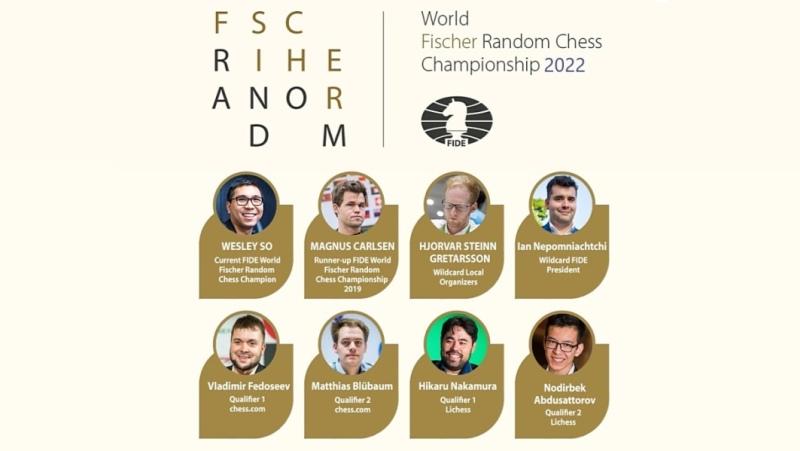
By GM Jonathan Tisdall The 2022 FIDE World Fischer Random Chess Championship is about to begin. The event will get its second official edition, this time in Reykjavik from 25-30 October 2022 — 50 years after Iceland’s capital first captured the attention of the classical chess world when it hosted the legendary Fischer-Spassky title match in 1972. The survivors and the seeds The road to Reykjavik has been either gruelling or easy, depending on the route taken. The qualification format is still in its infancy and has tried to strike a balance between being unusually open to the wider chess world than a traditional title cycle while also accommodating seeds and wildcards. The final eight here is the same amount as the traditional chess world’s Candidates Tournament, but there is one less ‘open’ spot since the champion does not sit and wait outside as a ‘final boss’, but joins the quarter-finalists in Fischer Random (FR). The FR titleholder, US Grandmaster (GM) Wesley So, is joined by dethroned runner-up — and classical world champion — Magnus Carlsen. Two players have been granted wildcard berths in the event: local representative and top-rated Icelandic GM Hjörvar Steinn Grétarsson and FIDE presidential pick Ian Nepomniachtchi, two-time classical title challenger and semifinalist in the inaugural FIDE Fischer Random championship in Norway in 2019. Photo: David Llada They will be joined by a quartet that have fought their way here over a horde of online competitors. Two of these — Vladimir Fedoseev and Matthias Blübaum – emerged from the chess.com online site qualifiers, open only to FIDE-titled players. Fedoseev will be a familiar face for Fischer Random fans — an aggressive, creative player, he was eliminated by remorseless champion So in the quarterfinals in 2019. German GM Blübaum is an exciting newcomer to the late stages of this event. The qualifiers held by the online site lichess.org represented the ‘democratic’ format of this particular world championship, with the first stages open to all players, so even those without titles or big credentials could test their skills at this form of the game and dream of adventuring far in the competition. The two winners were, nevertheless, decorated GMs. US GM Hikaru Nakamura is not only one of the best-known players in the world thanks to his popular streaming endeavours, but he is also a Fischer Random shark. When the effort to revive and raise the variant as a serious alternative to the classical game got off the ground in 2018 with an unofficial title match in Norway, Nakamura took on ‘conventional’ world champion Carlsen. Hikaru was chosen based on his 2009 match win over elite GM Levon Aronian, which was the final hurrah of the first series of elite FR events in Mainz, Germany. The other lichess qualifier in Reykjavik is Uzbekistani prodigy Nodirbek Abdusattorov. The just-turned-18-year-old has already managed to acquire an Olympic gold team medal and a World Rapid Chess Championship title for his trophy cabinet. Photo: Lennart Ootes From group to KO The players will be divided into two groups of four, with two advancing from each section, in World Cup football style. The semifinals and finals will be elimination matches, and the final day will also see duels involving all the players to determine each of the prize spots, depending on where they placed earlier. Besides the FIDE world title at stake, the players will be competing for a purse of USD 400,000 and a hefty first prize of $150,000. A return to human combat Historically, interest in playing chess variants with the piece positions shuffled has been fueled by a desire to make a break with charted knowledge in the opening phase of the game. As classical chess has been transformed by the influence of engine power, this long-held fear that the game was being overly worked out has finally become more realistic, with vast amounts of memorized ‘perfection’ beginning to burden top-level chess. The vista of 959 uncharted territories means that Fischer Random more or less erases book learning and that players are on their own from virtually the first move. The starting position will be revealed a scant 15 minutes before the start of play, and the players can consult with one designated human assistant — but no one and nothing else — in the brief intervals before the games begin. This opening clean slate makes Fischer Random hugely appealing to many — maybe most? — elite players who are freed from their usual intense and meticulous levels of preparation and can play with discovery and delight again. Paradoxically, it is often this aspect of the variant that can be an obstacle to acceptance with amateur players, who can feel lost without their favourite openings. In practice, this part of the game can be a great leveller, with stronger players more likely to stray or err early than would ever happen under ‘traditional’ circumstances. It is rare that a Fischer Random game never reverts to looking like ‘chess’, with how, and how long, this process takes being one of the most fascinating aspects of its play. Essential info The games rules are extremely simple: the pieces on the players’ first row are shuffled at random, with two factors kept in mind — the bishops must not be on the same colour square, and there must be a rook on either side of the king, to allow for castling. The rules of castling are the same as classical chess — but it is often the most shocking and eye-catching element of the variant since it usually happens from a very different starting point. For this event, the starting position will be redrawn at random if, by some chance, the classical set-up emerges from among the 960 alternatives. The chief arbiter will be Omar Salama, who has vast experience at major FIDE events, and is also both a FIDE Trainer and International Organizer. The rest of the officiating team are arbiters Shohreh Bayat and Ingibjörg Edda Birgisdottir — the latter will have

